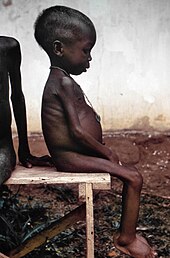
Back خط تموين بيافران الجوي Arabic Jirgin saman Biafra Hausa ബയാഫ്ര ക്ഷാമം Malayalam Ponte aérea de Biafra Portuguese

The Biafran Airlift was an international humanitarian relief effort that transported food and medicine to Biafra during the Nigerian Civil War. It was the largest civilian airlift and, after the Berlin airlift of 1948–49, the largest non-combatant airlift of any kind ever carried out. The airlift was largely a series of joint efforts by Protestant and Catholic church groups, and other non-governmental organizations (NGOs), operating civilian and military aircraft with volunteer (mostly) civilian crews and support personnel. Several national governments also supported the effort, mostly behind the scenes. This sustained joint effort, which lasted one and a half times as long as its Berlin predecessor, is estimated to have saved more than a million lives.[1]
The Nigerian government and some Nigerian military leaders stated the threat of genocide was fabricated and was "misguided humanitarian rubbish." They additionally stated that mass starvation was an intended goal, saying "If the children must die first, then that is too bad, just too bad,"[2] and "All is fair in war, and starvation is one of the weapons of war". There have been accusations that the airlift supplied weapons to Biafra, but these remain unsubstantiated.
- ^ Biafra Relief Heroes: remembering--in the words of those who were there..., Voice of Biafra International. Retrieved 2013-01-03
- ^ Nigerian Colonel Atakunie, (London Economist, Aug. 24, 1968 as cited in the Village Voice Oct. 17, 1968; and San_Francisco_Chronicle, July 2) as cited in Village Voice Oct. 17, 1968. Cited in The Tragedy of Biafra, A Report by the American Jewish Congress December 1968, page 24. Retrieved 2013-01-12